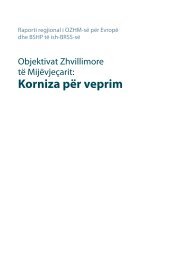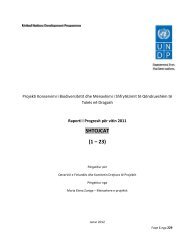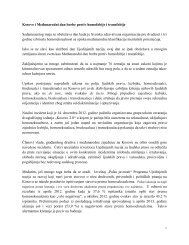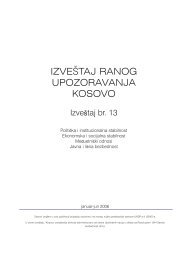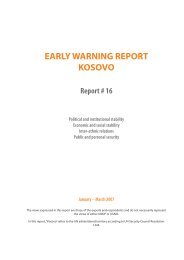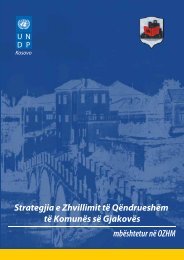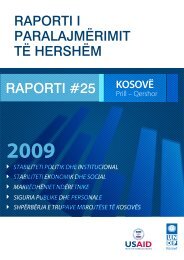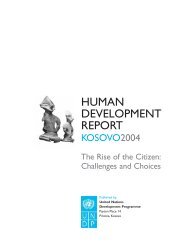Kosovo Human Development Report 2010 - UNDP Kosovo - United ...
Kosovo Human Development Report 2010 - UNDP Kosovo - United ...
Kosovo Human Development Report 2010 - UNDP Kosovo - United ...
Create successful ePaper yourself
Turn your PDF publications into a flip-book with our unique Google optimized e-Paper software.
the Department for Registration and<br />
Liaison with NGOs, there are 4,917 local<br />
NGOs and 447 international NGOs<br />
registered in <strong>Kosovo</strong>. 177<br />
Unfortunately, most of these NGOs<br />
have been unable to shake their dependency<br />
on donor funds. Therefore,<br />
most of them tend to be service-oriented<br />
- organized around short-term,<br />
donor-funded projects, and without<br />
strong constituencies. Moreover, most<br />
are temporary and tend to dissolve or<br />
become inactive after donor money<br />
has been spent. Few NGOs have attempted<br />
to continuously shape policy<br />
in support of the interests of particular<br />
constituencies, be they women, minorities,<br />
the disabled, or other marginal<br />
groups. While <strong>Kosovo</strong> has witnessed<br />
a boom in civil society, donor dependency<br />
casts doubt on the sustainability<br />
of current levels of civic engagement<br />
and of effective society constituencies.<br />
178 The monitoring capacity of<br />
NGOs is limited and their participation<br />
in the legislation process is poor.<br />
Without a strategic approach for<br />
their interaction with civil society organizations,<br />
<strong>Kosovo</strong>’s authorities have<br />
been unable to play a much-needed<br />
role to strengthen NGOs and give them<br />
an institutionalized place in the policy<br />
process. As a result, the vulnerable<br />
groups some NGOs represent are only<br />
ever consulted in an ad hoc manner, if<br />
at all. Their link to the political sphere<br />
is inconsistent and ephemeral, and<br />
without visible result. 179 Social support<br />
for NGOs is also weak – a vicious cycle<br />
fuelled by perception that they are neither<br />
truly effective nor orientated in a<br />
reliable way to social needs. According<br />
to the <strong>UNDP</strong> <strong>Kosovo</strong> <strong>Human</strong> <strong>Development</strong><br />
<strong>Report</strong> 2008, less than one third<br />
of Kosovans think that NGOs are open<br />
to public participation. As one of the<br />
roles of NGOs is to promote participation,<br />
this is a worrying statistic. 180<br />
(iii) Limited independence and<br />
impartiality of media: over the past<br />
few years considerable progress has<br />
been made to develop the media in<br />
<strong>Kosovo</strong>. However, securing a transition<br />
of the media from a source of entertainment<br />
to a European-style “fourth<br />
estate”, i.e., impartial watchdog and<br />
public platform, has not been easy.<br />
The news media is still a minority pursuit<br />
in <strong>Kosovo</strong>. The combined circulation<br />
of all daily newspapers is no more<br />
than 30,000, the lowest per capita figure<br />
in Europe. There are many reasons<br />
for the newspaper industry’s predicament,<br />
such as poor distribution and<br />
poor reading habits. 181 Moreover, the<br />
development of private television stations<br />
has been negatively affected by<br />
<strong>Kosovo</strong>’s weak economy and correspondingly<br />
sluggish advertising revenues.<br />
As a result, many newspapers<br />
and television programmes depend<br />
for their continued existence on public<br />
sector advertisements and international<br />
donor aid. 182 Strong concerns<br />
have also been raised by the general<br />
public about political influence on<br />
newspapers. 183 The Press Council and<br />
the Association of Professional Journalists<br />
of <strong>Kosovo</strong> have often complained<br />
of political interference in the work of<br />
the media. Documented cases of political<br />
intimidation call for more robust<br />
measures by the <strong>Kosovo</strong> authorities in<br />
order to ensure the freedom of expression.<br />
184<br />
<strong>Kosovo</strong>’s weak media environment<br />
does not, therefore, serve as a platform<br />
for <strong>Kosovo</strong>’s full social spectrum. Instead,<br />
it is a vehicle for the more privileged<br />
Kosovans – literate, middle class,<br />
educated and ethnic-Albanians. Voices<br />
to challenge governance status quo, or<br />
invite a broader public debate on behalf<br />
of minority groups, are largely absent<br />
or marginalized. A more inclusive<br />
media would be a strong step forward<br />
towards a more inclusive society.<br />
(iv) Socio-cultural discrimination:<br />
<strong>Kosovo</strong> battles deep-rooted socio-cultural<br />
blocks to a wide-ranging<br />
POLITICAL PARTICIPATION AND EXCLUSION<br />
| 81



